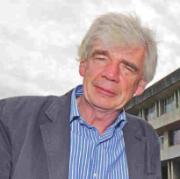
Andrew W. Mellon Senior Scholar, Prof John Holloway said that capitalism will fall if the exploitation of workers does not increase, when he addressed a packed audience at the Eden Grove Blue Lecture theatre.
He was addressing the audience on the topic entitled: “We are the crisis of capitalism and proud of it”, as part of the Lineages of Freedom series hosted by Rhodes University Humanities in conjunction with South African Humanities Deans’ Association.
“Capital depends for its very existence on labour, that is being able to force people to undertake what is generally an unpleasant and often meaningless activity called labour,” said Prof Holloway. He added that the crisis emanates from the relationship between capital and people.
Capital is different from any previous form of domination that humanity has ever faced. “It depends not only on our subordination but also on the constant intensification of that subordination,” he said.
Prof Holloway said since capital requires the workers to work faster and harder it creates insubordination that might not appear to be insubordination. “No matter how eager workers are to please their dear masters, they will tend to assume that they can work today as they did yesterday,” he said. “That is simply not true because working at a pace of yesterday does not produce value today.”
This insubordination can take the form of not coming to work, coming to work late or workers’ strikes. When capital is faced with “incapacity or unwillingness to speed up sufficiently”, it either flees or confronts the workers.
The most dominant form of fleeing in the 21st century has been to “flee into fiction”, the creation of credit. “The creation of credit is always a bet on the future,” said Prof Holloway. “If all goes well we will be able to screw enough out of the workers to make it a reality in the future.”
Credit helps impose subordination on the workers because more people find themselves tied up with debts.
Prof Holloway said that capital is faced with these two options everywhere in the world. “On international level, each government tries to maintain confrontation and fleeing in a way that keeps itself as an attract location for investment,” he said
Human beings are at the centre of the capitalist system which they cannot eradicate. A possible way out of this crisis, he suggested, would be to adopt the approach of the Unemployed People’s Movement (UPM) in Argentina who campaigned for collective subsidies for their communities. They then decided how to use that money in activities that improved their communities.
He added that the UPM in Argentina “developed a struggle of doing against labour, the struggle for a different sort of activity, one that begins to create the basis for a different world.”
Education has a role to play in the creation of this new world. “Education must be anti-capitalist, but anti-capitalist education cannot simply be a question of denouncing, it cannot simply be a question of preaching about the revolution. It has to be a question of thinking of practical ways,” he added.
Nomalanga Mkhize, who was the discussant, said that the fight against capital would not be easy to win because of people’s relationship with capital. “The contradiction is that for us the attack on capital is soothed by our consumption.”
She added that what is need is a different type of strategy. “What we need is a new language and praxis, a new way of living our lives”
Photo: Ian Carbutt
